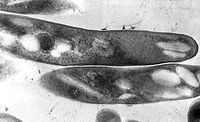
Photo from wikipedia
Abstract Background Mycobacterium genavense infection is rare and can occur in immunocompromised patients without human immunodeficiency virus (HIV). Methods We describe 2 cases of M genavense infection in solid organ… Click to show full abstract
Abstract Background Mycobacterium genavense infection is rare and can occur in immunocompromised patients without human immunodeficiency virus (HIV). Methods We describe 2 cases of M genavense infection in solid organ transplant (SOT) recipients, and we performed a literature review of immunocompromised patients without HIV. Results Fifty-two cases are reported. Predisposing factors were receipt of SOT (40.4%) and autoimmune disease (36.5%). Infection was disseminated in 86.5% of cases. Organs involved were lymph nodes (72.3%), gastrointestinal tract (56.5%), lung (35.5%), and bone marrow (28.8%). Most patients were treated with at least 3 antimycobacterial agents (98%), with a clinical cure achieved in 54.9%. In multivariate analysis, lack for cure was associated with age of the time infection (odds ratio [OR], 15.81 [95% confidence interval {CI}, 2.92–152.93]; P = .011) and positive bone marrow culture (OR, 1.05 [95% CI, 1.01–1.12]; P = .042). Conclusions Mycobacterium genavense infection is a rare and generally disseminated disease with a poor prognosis. Optimal treatment regimen and its duration remain to be defined.
Journal Title: Open Forum Infectious Diseases
Year Published: 2022
Link to full text (if available)
Share on Social Media: Sign Up to like & get
recommendations!